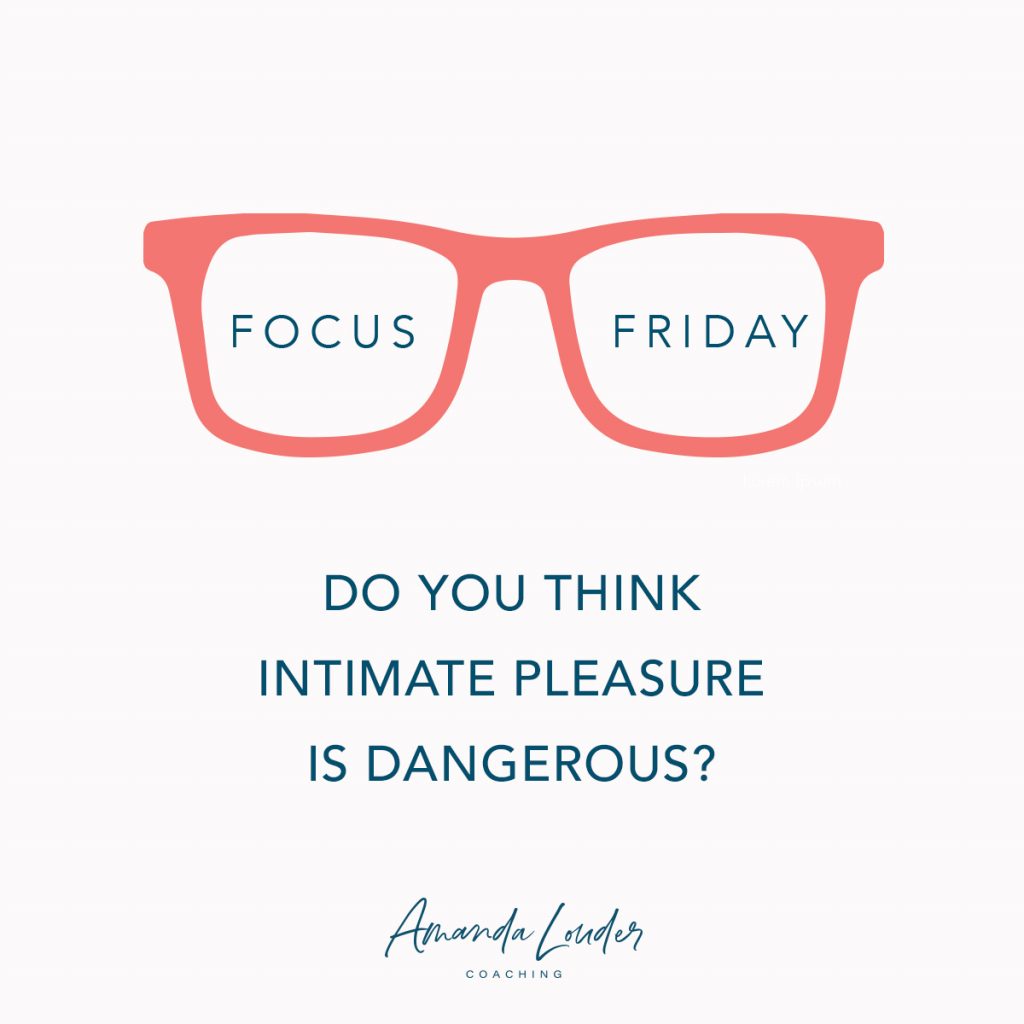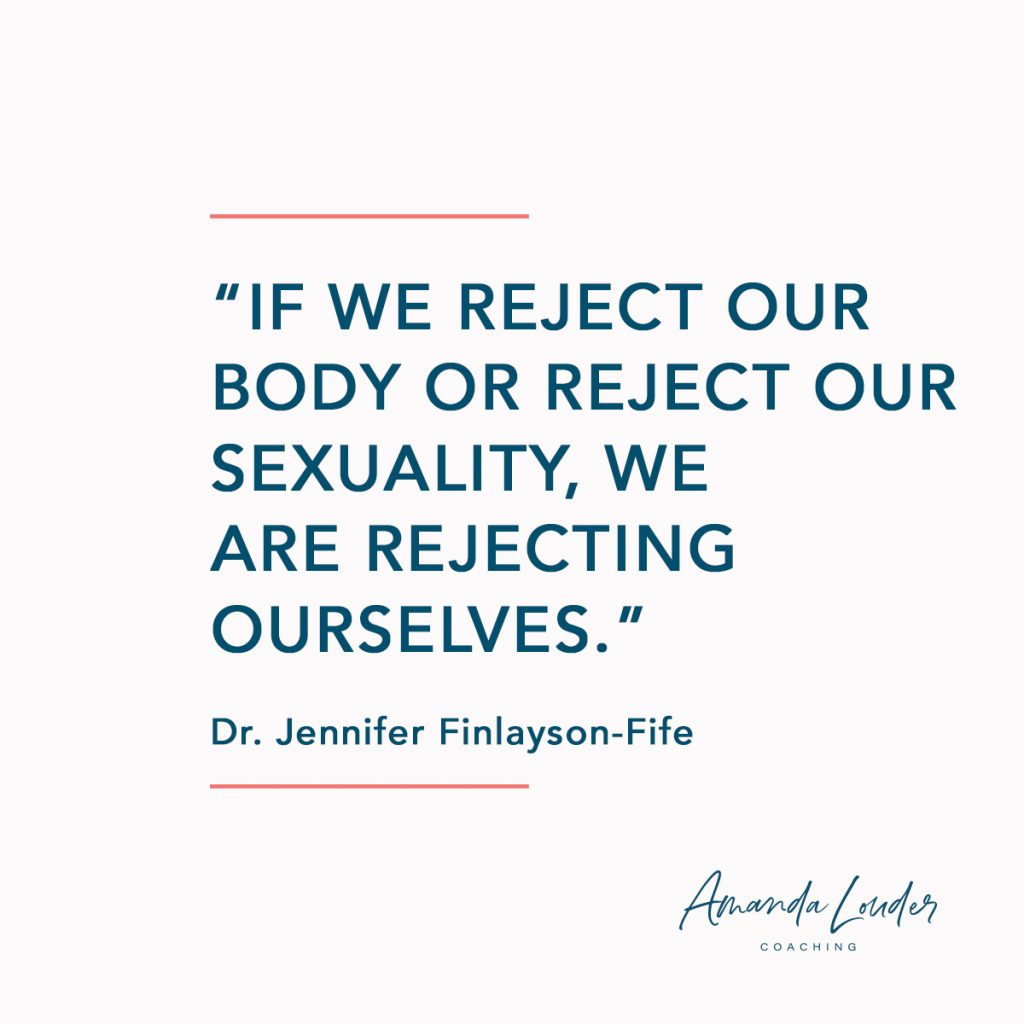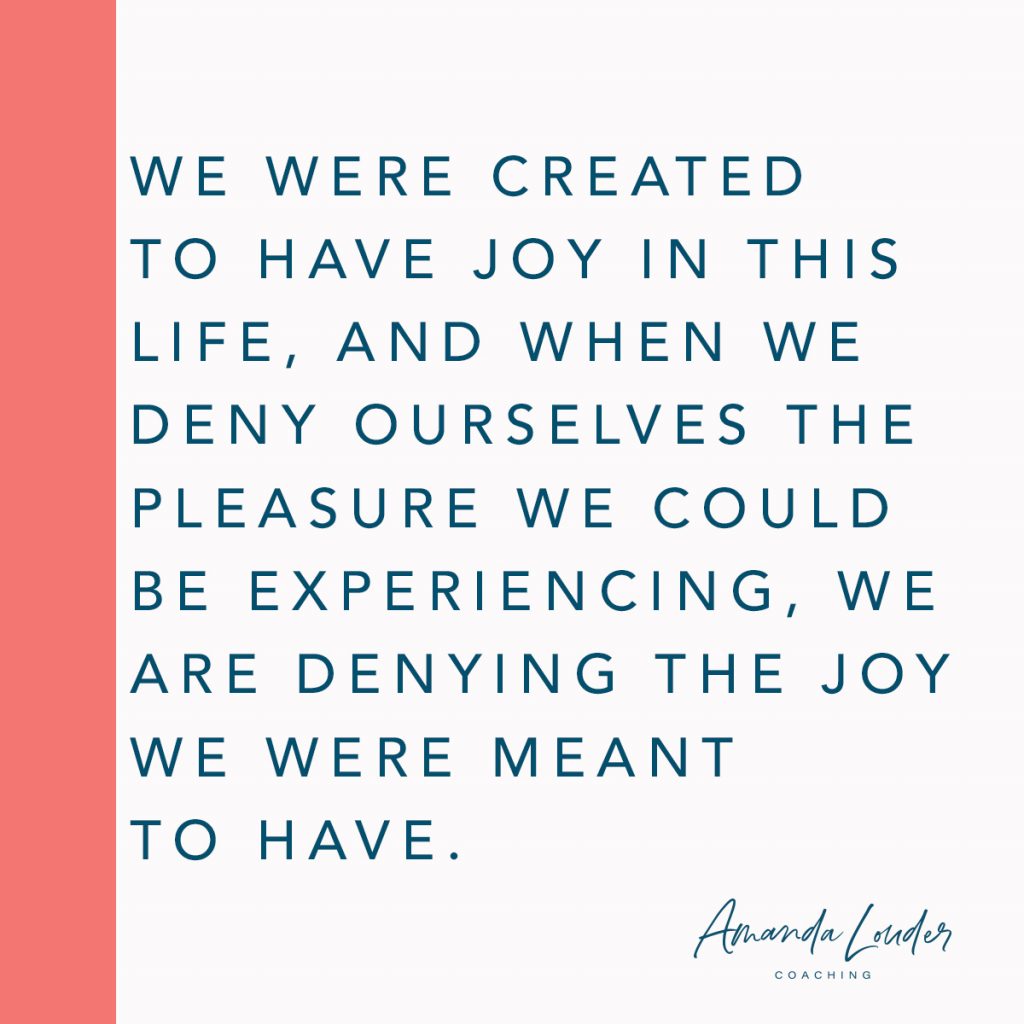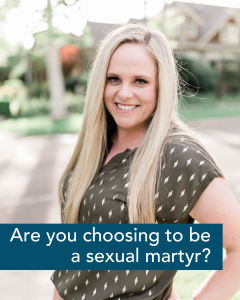
I want to ask you a question. Are you afraid of pleasure? Maybe you’re thinking, “Of course not! I find pleasure in my family or my job.” But the pleasure I’m talking about is intimate pleasure. Are you afraid to let go and be vulnerable in order to feel pleasure? Is it easier to focus on your spouse’s pleasure rather than yours? In this episode, I share with you why pleasure is important! Why, in fact, it’s part of who we are made to be!




Show Notes:
Follow Amanda on Facebook and Instagram.
Join Amanda’s Private Facebook Group.
References for this episode:
Show Summary:
Pleasure is all around us. We can have access to pleasure at every turn with experiences of all different kinds. Entertainment, food, connection with friends and family. Yet, many of us are not that skilled in experiencing true, intimate pleasure, and are instead, very guarded against it.
Google dictionary defines pleasure as: “A feeling of happy satisfaction and enjoyment.” And we are willing to experience this happiness, satisfaction, and enjoyment in many areas of our lives, but when it comes to intimate pleasure…nope.
We have this belief that pleasure can put us on the slippery slope. Lead us down a misguided path straight to hell. That allowing pleasure in our lives leads to addictions, gluttony, and hedonism. And thinking about pleasure in this way, allowing ourselves to feel pleasure seems dangerous. Which is exactly why we can’t let go and actually feel pleasure.
I feel the “slippery slope” fallacy has become one of the biggest obstacles to embracing our sexuality. The slippery-slope is a fear-based mindset that ultimately stunts our growth and development. It also minimizes the power of the atonement. We are supposed to make mistakes and learn from them. Making decisions out of fear that there is “no coming back” is antithetical to God’s plan. And if it is something that we are supposed to experience in this life…is there even a slippery slope? I don’t think so.
Dr. Jennifer Finlayson-Fife said “A lot of us are terrified of pleasure. We think that righteousness and spirituality are antithetical to pleasure. Being anti-pleasure is as anti-spiritual as indulgent pleasure is. It’s the immoderation around pleasure that interferes with our peace, joy, and our ability to do good.”
She also says that “we are embodied beings. If we reject our body or reject our sexuality, we are rejecting ourselves.” And I would add to that, when we reject the pleasure that our body was created to give us, we also reject ourselves and in who’s image we were created.
In the garden of Eden, Eve partook of the fruit so that she, Adam, and their posterity could know and understand both the good and the bad. The pleasure and the pain. We are supposed to experience both! The problem comes when we spend too much time indulging in pleasure. When pleasure becomes our priority over anything else. But, we are so afraid of swinging to that side of the pendulum, that we swing to the complete opposite side of the pendulum and don’t allow ourselves the pleasure that life, marriage, and a sexual relationship can offer us. Rather than finding the moderation in it, we don’t allow ourselves the very thing that we were created for.
Many of the traditions in religion throughout time and throughout the world thought that in order to connect to the divine we had to remove things. I think about the Catholic religion and the priests and nuns who have to be celibate, they can’t marry. There are monasteries where they aren’t allowed to talk. These pleasures in life were taken away thinking that it would be easier to connect to the divine. Yet this is completely antithetical to our theology. We need both ends of the spectrum. That through our embodiment and the physical gifts that we have been given, we can experience the most pleasure available to us on earth and that pleasure can actually connect us to each other and the divine in a way that nothing else can. We are literally becoming as God as we create love, connection, pleasure, and maybe a child.
So, because of these religious traditions throughout time and the world we have so much shame and judgement about our bodies and about sex, which again, I think is antithetical to our theology. This judgement and shame that we have is carried in our bodies and can create one of two things. It either creates numbness, an inability to feel, or it creates tension.
A lot of women tell me how much anxiety they carry all of the time. This tension and anxiety create pain and/or numbness in the body. So we are unable to fully relax, release, and feel what we are supposed to. And we think this is normal. It’s not. This tension keeps us from feeling desire, pleasure, and even orgasm. A lot of women tell me that their minds are just constantly racing during sex. Thinking about all they have to do, thinking about their body and if it looks ok and is positioned right. Thinking about what their husband might be thinking. Is he attracted to me? Does he think it’s taking too long? Is he bored? And a lot of times the reason we have so much going on in our brains during sex is because it’s easier to THINK than to FEEL. You don’t want to feel the tension, the guilt, the judgement, the shame. And so you try to escape these emotions by thinking instead of feeling. And you aren’t doing this consciously. This is your body’s way to protect you…because you believe that sex is dangerous.
One of my clients in my group coaching program right now was messaging me. She’s only been in the program for 3 weeks and has already has some dramatic shifts. Every day was full of anxiety for her. And because of this anxiety she was short with her kids, not connecting with her husband, and really judging herself for it. But just after 3 short weeks, she was understanding herself and her anxiety better, releasing the anxiety, and the desire and the pleasure were coming back in full force. When she learned to feel her emotions, instead of resisting them, it helped her process them and move forward and then she was able to feel so much more.
Sometimes women tell me that they really don’t care about the orgasm or the pleasure, they just want the connection and the intimacy. But I believe that pleasure is really important and makes the connection and intimacy better. When we want to connect with people, a lot of times we do that through things that are fun and exciting and pleasurable. But in the bedroom, when things become fun, exciting, and pleasurable and we are really opening ourselves up, it creates a vulnerability in us. And that can feel scary and sometimes even unsafe. So we shut down that pleasure. We turn it around so the focus isn’t on us and our pleasure and just focus on our spouse, and then we are often left unfulfilled.
When we deny ourselves the pleasure that life is supposed to bring, we are denying a part of ourselves and what this life was meant for and what our body was meant for. We are denying ourselves of living fully and consciously taking full enjoyment in what we are experiencing. We were created to have joy in this life, and when we deny ourselves the pleasure we could be experiencing, we are denying the joy that we were meant to have.
What do you find pleasurable? Can you be conscious and pay attention to our sensual experiences (seeing, hearing, tasting, smelling, and touching?) and recognize that the feelings of “happy, satisfaction, enjoyment, and pleasure” comes from paying attention to what is going on in our lives and being present.
What could focusing on the sensual experience, the pleasurable experience of sex create for you and your relationship? Could you be less judgmental of yourself? Could you focus more on what is going on between the two of you? Do you feel worthy of pleasure?
Can you surrender yourself to yourself? To your partner? Do you trust that? Why or why not?
If you answered no to any of these questions, I want to invite you to come talk to me. I offer a free consultation to all potential clients to see if we are a good fit. It’s really easy, we can do a phone call or a zoom session. We talk about what your sexual relationship is like now and what you would like to be. And I give you some small shifts in the way that you are thinking so you can walk away from the call with something tangible, even if we never work together. It’s about 30 minutes and is such an amazing experience. To sign up, go to my website AmandaLouder.com and there is form on the homepage.



